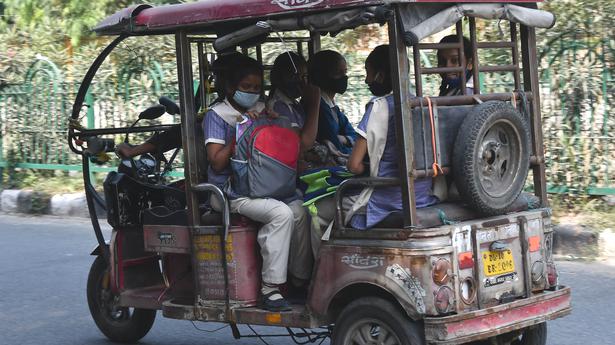
Between a rock and a hard place, Delhi’s e-rickshaws
The Hindu
Traffic policemen describe them as “havoc”, but its drivers tell a different story
Since they were introduced to the streets of the Capital back in 2012, e-rickshaws have become the crucial mode of transport for last-mile connectivity here. However, for the Delhi Traffic Police, which has been cracking down on these vehicles, e-rickshaws are “havoc on the streets”.
The e-rickshaw drivers in Delhi earn anywhere between ₹300 to ₹400 a day, costing commuters around ₹10 or less for a trip. Most e-rickshaws ply around bus stands and metro stations.
According to the traffic rules, e-rickshaws are supposed to follow a seating capacity of four persons, excluding the driver. Officials also said that the vehicles should be registered as transport vehicles, which are granted contract carriage permits. The registration certificate for the vehicle is valid for five years, whereas the fitness certificate has to be renewed every year.
According to data available with the Delhi Traffic Police, more than 61,000 challans have been issued to e-rickshaws under the Motor Vehicles Act, 1988, for several traffic violations such as improper parking, permit violation, dangerous driving, among others.
Similarly in 2020, 24,645 challans were issued to e-rickshaws while in 2019, before the breakout of the COVID-19 pandemic, a total of 160,534 challans were issued against the vehicles.
The data further shows that violation of restrictions, when e-rickshaw drivers are found to be operating beyond their permitted area, constituted the most challaned traffic offence last year, with 27,662 challans issued to e-rickshaw drivers. In both 2019 and 2020, improper parking constituted the most challaned traffic offence.
An e-rickshaw driver, Parvez Alam (52), who was challaned for violation of restrictions claimed these challans were often arbitrary in nature. “Once I was taking some passengers towards Red Fort but police suddenly made it a No-Entry zone that day and fined me for driving in the area...we won’t get any passengers if most areas are out of bounds”.











